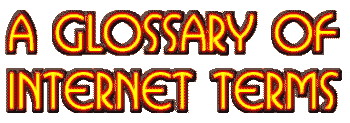

Below are some terms you may encounter while exploring the Internet, as well as some links to other glossaries available on-line.
Before the Internet and WWW came about, the BBS ranked among the most popular way for users to get together electronically. Despite the Internet revolution, bulletin boards still serve a number of purposes. For more information on this topic, click here.
The term also applies to how many times your site has been accessed by people. Many sites have counters to inform visitors how popular a page is.
Other glossaries on the World Wide Web
BABEL: Computer Related Abbreviations and Acronyms Diccionario de Términos Informáticos (En Espanol y Ingles) The Free On-line Dictionary of Computing PC Webopaedia Netlingo.com Whatis.com
The glossary will be updated and expanded
This page was last updated on May 1999
in the future, so do check back.
© Copyright 1997 - 1999
A Glossary of Internet Terms
All Rights Reserved